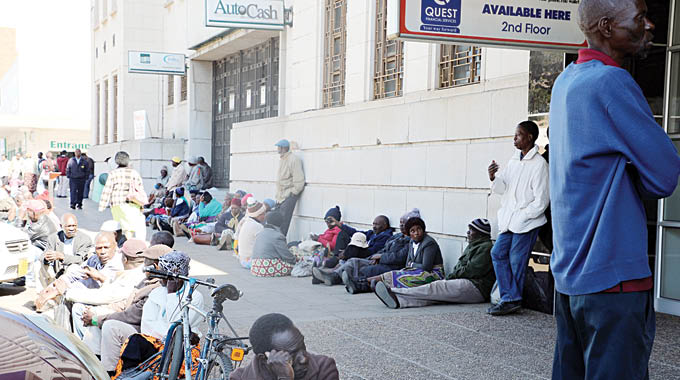Cash demand exceeds supply . . . ‘Customers not depositing cash back into banking system’

Pride Mahlangu, Business Reporter
THE Bankers’ Association of Zimbabwe (BAZ) says demand for cash remains higher than supply as many clients do not deposit their funds back into the system despite continued withdrawals.
Long winding queues persist in banking halls across the country despite injection of more cash into the system by the Reserve bank of Zimbabwe. Just last week Treasury revealed that the monetary authority injected additional $20 million of bank notes into circulation, which was expected to ease the cash crisis.
BAZ president, Mr Webster Rusere, told Business Chronicle that while the cash drip-feed process was progressing well, improvement was imminent over time. He admitted bank queues persist and that these could not disappear overnight as the cash injections coincided with payments of salaries that have a high demand for cash.
“The demand for cash far exceeds the supply. Banks have had to rely on allocations from Reserve Bank of Zimbabwe only as customers are not depositing cash back into the banking system,” he said.
“Banks have to ensure clients are given an equal opportunity to access the available cash. We are not seeing much in the way of deposits and denominations of less than 50 cents are finding little acceptance and apparently the market is rejecting these.
“While some deposits were received by banks, given the high demand and the fact that very little if any cash is being deposited into banks this situation can only improve as confidence and greater acceptance of electronic transfers by all players of the market is witnessed.”
Mr Rusere explained that as each bank receives a cash allocation from the Reserve Bank of Zimbabwe, it then allocates to branches and ultimately to customers.
“The withdrawal limits are subject to guidelines from the Reserve Bank of Zimbabwe and currently withdrawal limits are set at ZWL300 per week per customer,” he said.
The BAZ leader commended the country for quickly embracing digital banking platforms such as mobile money, point of sale, internet banking and RTGS transfers. He encouraged clients to use these channels rather than relying on cash for their purchases.
Meanwhile, Government has said that it will soon introduce higher currency denominations of up to ZWL$10 and $20 notes. Economists say while the RBZ was right to increase cash in circulation given the high demand, it would take time before cash queues start to subside. The recommended cash levels in circulation are 10 percent to 15 percent of money supply, which is presently estimated at $19 billion.
This means Zimbabwe requires about $2 billion in physical cash, yet there is about $720 million in circulation. Since the introduction of new notes and coins in November, about $120 million has been injected into circulation. The RBZ introduced new $2 coins and $2 and $5 notes following a surge in demand for cash in the informal sector, which operates largely on a cash basis or offers discounts for cash. Informal traders say that this allows them to buy black market foreign exchange at a discount. The central bank has stressed that low denomination coins have not been decommissioned and can be exchanged at banks across the country for bigger denominations of notes or coins. – @pridesinstinctz.











Comments